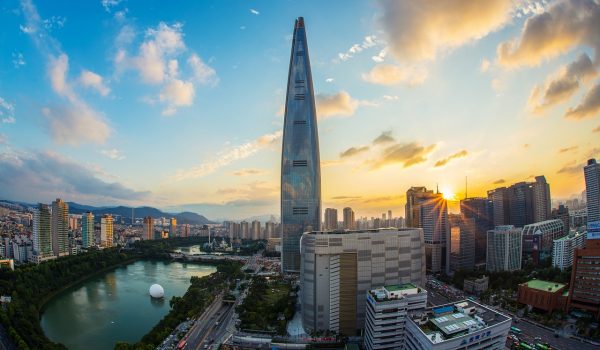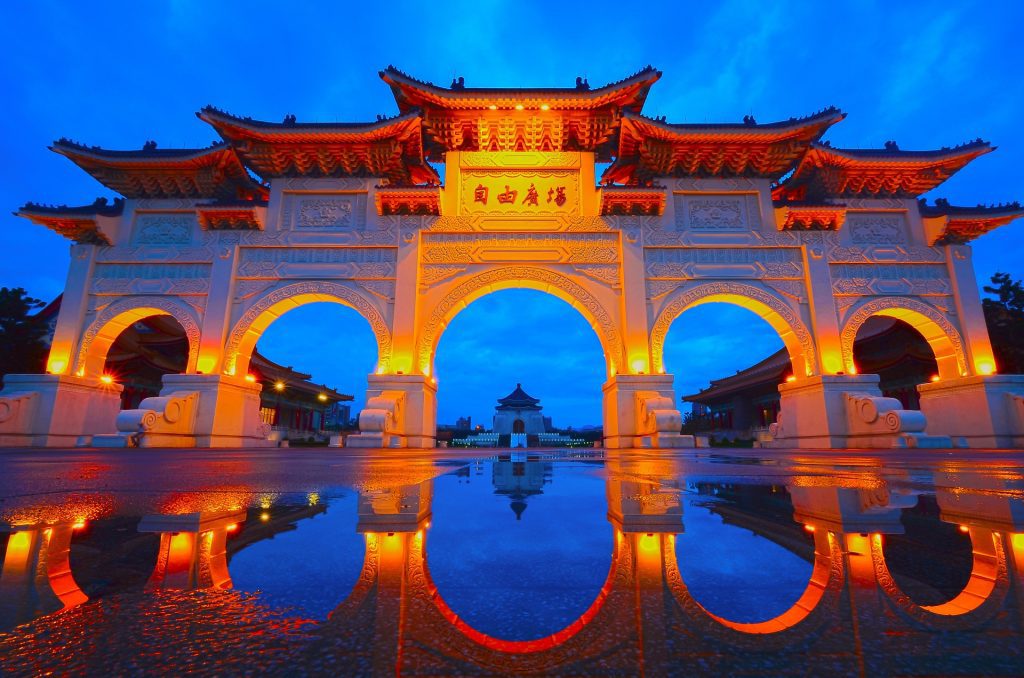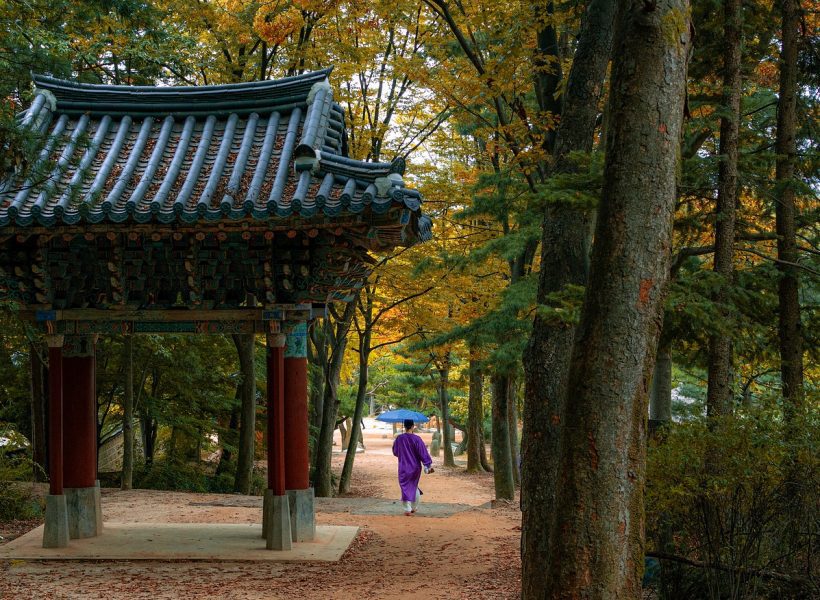Past Meets Present: South Korea and Taiwan
November 6–20, 2024
Led by Karil Kucera, Professor of Art and Art History & Asian Studies, and Daniel Jones, Botanist and Ecologist

Visit Buddhist sites and learn about indigenous traditions, kingdoms of the past, historic villages, and contemporary life in these two small but abundant countries. Expand the overview to the right for more information on what we’ll see, do, and learn.
Visit historic temples, enjoy great tastes, and experience the fascinating day-to-day culture of these two less-traveled areas of Asia. Expand the Overview to the right to learn more about what we’ll see, do, and learn, and to see an awesome slideshow of the itinerary.
Korea and Taiwan — their names alone conjure up a multitude of images from the recent past. But there is much more to each of these countries than what the twentieth century has given us. We will spend thirteen days moving through the many layers that make up these two small but powerful countries, learning about their history and cultural traditions by engaging with some of the many exceptional places they have to offer.
We begin with a few days in Seoul, South Korea, where we’ll encounter both the past and present in a hands-on fashion with visits to a local village and the royal palace as well as a day venturing out to the Demilitarized Zone. After Seoul, we’ll head south via bullet train to the city of Gyeongju, where we’ll visit some of the most extraordinary sites Korea has to offer in what is often referred to as a “museum without walls”. Among the fascinating relics of the past to be found there are the royal tomb mounds of Korea’s fifth-century kings and the Buddhist sites of Bulguksa and Seokguram, all of which are part of one vast World Heritage Site. Finally, we will travel to Busan, visiting the Buddhist temple Haiensa, home to the oldest set of Buddhist printing blocks in the world, dating to the 12th century. We’ll wrap up the Korea portion of the trip with a visit to one of Korea’s oldest and largest markets. While visiting all the sites, we’ll discuss Korea’s role in the development of Asia over the centuries.
From Busan, we’ll take the short two-hour flight down to Taiwan. Starting off literally at the top, we’ll start with a birds-eye view of the city of Taipei from one of the tallest buildings in the world, Taipei 101.Diving right into the local culture with some of the best food in all of China, we’ll have a meal at one of the many great restaurants Taiwan has to offer. The next seven days will feature a mix of art, architecture, spectacular scenery and local culture:
- Contemplate the artistic richness of China past and present with a guided visit to the National Palace Museum, home to the treasures of the Forbidden City.
- Experience religious life at the famous Buddhist temple of Longshan.
- Take in the views at the Yehliu Geopark on Taiwan’s north coast.
- Enjoy seafood fresh off the boat in Guihou village .
- Learn more about Taiwan’s Spanish past with a visit to Fort San Domingo.
- Find a souvenir or antique on Tamsui’s Old Street.
- Learn about the traditions of the indigenous Taiwanese Truku people.
We’ll start in Seoul and end in Taipei. You can view – and download or print if you wish – the most up to date itinerary here.
You’ll get the most out of study travel if you research what to do during your free time. This allows you to reap the benefits of group travel, while also customizing the tour to your interests and activity level. Read more about How to Be an Independent Group Traveler.

Karil Kucera is Professor of Art History and Asian Studies at St. Olaf. Her research centers on sacred sites, with her most recently completed work on the cliff sculptures found at the Buddhist cave site of Baodingshan in Sichuan province. This interest has produced a course entitled “Buddhism through Text and Image”, as well as a course on sacred sites of Asia. She is currently working on a digital textbook related to her sacred sites course.
Karil has also spent a considerable amount of time pursuing issues related to the art of teaching. She has been actively involved in working with digital imaging issues, and has lectured on appropriate as well as effective usage of imagery in the classroom. She is a co-creator of a multimedia /multi-cultural/multi-institutional Asian Studies database, the IDEAS project. IDEAS, an Image Database to Enhance Asian Studies, is available at www.ideasproject.org. Karil has also been actively working with students to put on exhibitions using materials from the St Olaf Flaten Art Museum collection.
Karil completed her Ph.D. in Chinese art history at the University of Kansas, her Master’s degree at the University of Oregon, and her BA at the University of Wisconsin-Madison. Prior to coming to St Olaf College, Karil held a postdoctoral position at the University of Washington in Seattle, and had previously taught as a visiting professor at Dartmouth and Lewis and Clark College in Portland. She has lived and traveled extensively throughout Asia and has led more than a dozen study tours to Asia for students. She will be joined by her husband, Daniel Jones, who will serve as co-leader of the group. Karil and Daniel have been traveling together in Asia for over 25 years, most recently with St Olaf alumni friends and family to Bhutan and Indonesia.
Daniel Jones is a professional botanist and ecologist with over 30 years experience studying and documenting the impacts of major projects on natural resources with specific expertise in rare plants and native plant communities. He has mapped native plant communities and conducted field surveys for state- and federally-protected endangered and threatened plants, mosses and lichens throughout the Midwest, the northern Great Plains, the Pacific Northwest and northern California. He is well versed in federal and state endangered species law and provides consultation assistance to industry and agency clients on compliance with those laws. Daniel also has expertise in the National Environmental Policy Act and its state equivalents, and has been a lead or contributing author on numerous federal and state environmental impact statements and associated documents.
Daniel has a B.S. in Botany and Plant Pathology from Michigan State University, and a M.S. in Biology (Ecology and Evolution) from the University of Oregon. He is a MN Master Naturalist, and is currently working as a senior environmental scientist with HDR, Inc., an international engineering and architectural firm based in Omaha, Nebraska.
Expect to immerse yourself in the study of Asian culture, religion, history, and contemporary life as embodied by South Korea and Taiwan!
Movement between cities will be by air-conditioned private motor coach. Movement within each city and at cultural/historic sites will be on foot and with public transportation, requiring a lot of walking and standing, often over uneven ground. You should be capable of walking a mile or more at a time and up to five to seven miles per day, often over uneven terrain, of climbing stairs that may not have handrails, of climbing in and out of various types of transportation, of keeping pace with an active group of travelers on long days of traveling,of dealing with the emotional highs and lows that can occur when experiencing different cultures, and be a considerate member of the group (prompt, courteous and flexible).
Any participant who has demonstrated an inability, in the opinion of the tour leader, of keeping up with the group or of safely participating in program activities may be prohibited from participating in certain activities.
You will be responsible for carrying your own luggage throughout the tour. Traveling lightly is highly recommended.
Hotels will be tourist class (four-star or superior rating) with private baths, air conditioning, and English-speaking staff.
The tour price is $6,982 per person, based on double occupancy. A supplement of $960 applies for single occupancy. Inclusions and exclusions vary from tour to tour. Please read the following information carefully.
Inclusions: discussions led by Karil Kucera, a full-time guide, accommodations, breakfast daily and group meals as listed on the itinerary, admissions for group activities, ground transportation during the tour (except initial and final airport transfers), transportation between the countries, gratuities to group guides, drivers, and meal servers, and some limited medical coverage while overseas.
Exclusions: Airfare to and from Asia is not included. Participants are solely responsible for all expenses not specifically included in the tour fee. Examples of excluded expenses are: international airfare, airport transfers, any passport and visa fees, any recommended immunizations or vaccinations, baggage and trip cancellation insurance, alcoholic beverages, including at group meals, laundry, dry cleaning, phone charges, room service or other items of a personal nature, expenses incurred during free time or non-group activities, lunch and dinner, unless specifically included on tour itinerary.
Please note: the trip price comes to $537 per programmed day (i.e., it does not include pure travel days, because international airfare is not included in the trip price). The average cost per day for trips in 2023 was $588. At less than the most recent year’s average, this is a great value for your travel dollars and we have kept that top of mind as we put finalized this trip price.
This schedule is based on payments St. Olaf College must make to tour vendors to guarantee group rates. We highly recommend that you purchase additional trip cancellation insurance at the time of registration to recover your payments should you need to withdraw from the tour.
Deposit due: $500 upon registration
Refund if you cancel: Full refund ($500) until January 31, 2024. If the deposit is made after January 31, 2024 there is no refund.
Interim payment due: $2,000 on February 1, 2024
Refund if you cancel: $1,000 if you cancel before August 31, 2024
Balance due: September 1, 2024
Refund if you cancel: None, unless the tour is full and your place can be resold
Cancellations must be in writing.
Get some details about a variety of tour aspects with the Trip Information Sheet.
Access the Resource List and several book PDFs.
Closely read the Go Message.
See the Terms & Conditions and Release & Waiver that you agreed to when you registered.
Review the latest information on recommended immunizations from the Centers for Disease Control (CDC).
Look at the International Travel section of the U.S. State Department, including Before You Go, Country Information, While Abroad, and Emergencies.
Check your passport to ensure that it has at least 6 months’ validity past the tour return date. Should you need to renew, visit the U.S. State Department for instructions. (Note: no visa is required for either country.)
Take time to prepare for your adventure by checking out a variety of resources, including frequently asked questions, general health information, included travel insurance, safety overview, and more.
Book your flights. This tour is an official GO — please read the Go Message linked above. The airport most often used in Seoul is ICN and the airport most often used in Taipei is TPE. You can also take a look at our tips on Booking Your Flights.

Registration for this tour has now closed.
You must be logged in to post a comment.